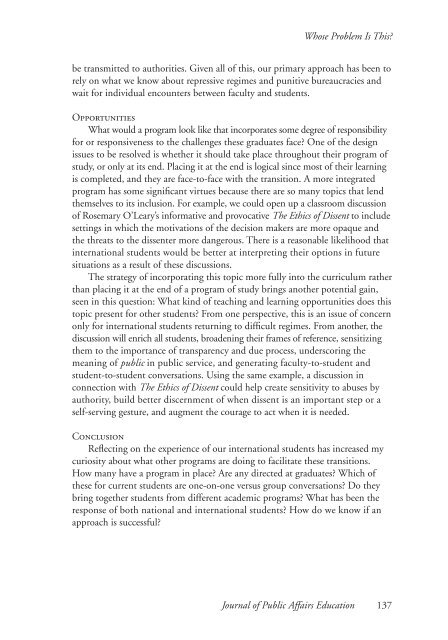Journal of Public Affairs Education
You also want an ePaper? Increase the reach of your titles
YUMPU automatically turns print PDFs into web optimized ePapers that Google loves.
Whose Problem Is This?<br />
be transmitted to authorities. Given all <strong>of</strong> this, our primary approach has been to<br />
rely on what we know about repressive regimes and punitive bureaucracies and<br />
wait for individual encounters between faculty and students.<br />
Opportunities<br />
What would a program look like that incorporates some degree <strong>of</strong> responsibility<br />
for or responsiveness to the challenges these graduates face? One <strong>of</strong> the design<br />
issues to be resolved is whether it should take place throughout their program <strong>of</strong><br />
study, or only at its end. Placing it at the end is logical since most <strong>of</strong> their learning<br />
is completed, and they are face-to-face with the transition. A more integrated<br />
program has some significant virtues because there are so many topics that lend<br />
themselves to its inclusion. For example, we could open up a classroom discussion<br />
<strong>of</strong> Rosemary O’Leary’s informative and provocative The Ethics <strong>of</strong> Dissent to include<br />
settings in which the motivations <strong>of</strong> the decision makers are more opaque and<br />
the threats to the dissenter more dangerous. There is a reasonable likelihood that<br />
international students would be better at interpreting their options in future<br />
situations as a result <strong>of</strong> these discussions.<br />
The strategy <strong>of</strong> incorporating this topic more fully into the curriculum rather<br />
than placing it at the end <strong>of</strong> a program <strong>of</strong> study brings another potential gain,<br />
seen in this question: What kind <strong>of</strong> teaching and learning opportunities does this<br />
topic present for other students? From one perspective, this is an issue <strong>of</strong> concern<br />
only for international students returning to difficult regimes. From another, the<br />
discussion will enrich all students, broadening their frames <strong>of</strong> reference, sensitizing<br />
them to the importance <strong>of</strong> transparency and due process, underscoring the<br />
meaning <strong>of</strong> public in public service, and generating faculty-to-student and<br />
student-to-student conversations. Using the same example, a discussion in<br />
connection with The Ethics <strong>of</strong> Dissent could help create sensitivity to abuses by<br />
authority, build better discernment <strong>of</strong> when dissent is an important step or a<br />
self-serving gesture, and augment the courage to act when it is needed.<br />
Conclusion<br />
Reflecting on the experience <strong>of</strong> our international students has increased my<br />
curiosity about what other programs are doing to facilitate these transitions.<br />
How many have a program in place? Are any directed at graduates? Which <strong>of</strong><br />
these for current students are one-on-one versus group conversations? Do they<br />
bring together students from different academic programs? What has been the<br />
response <strong>of</strong> both national and international students? How do we know if an<br />
approach is successful?<br />
<strong>Journal</strong> <strong>of</strong> <strong>Public</strong> <strong>Affairs</strong> <strong>Education</strong> 137



